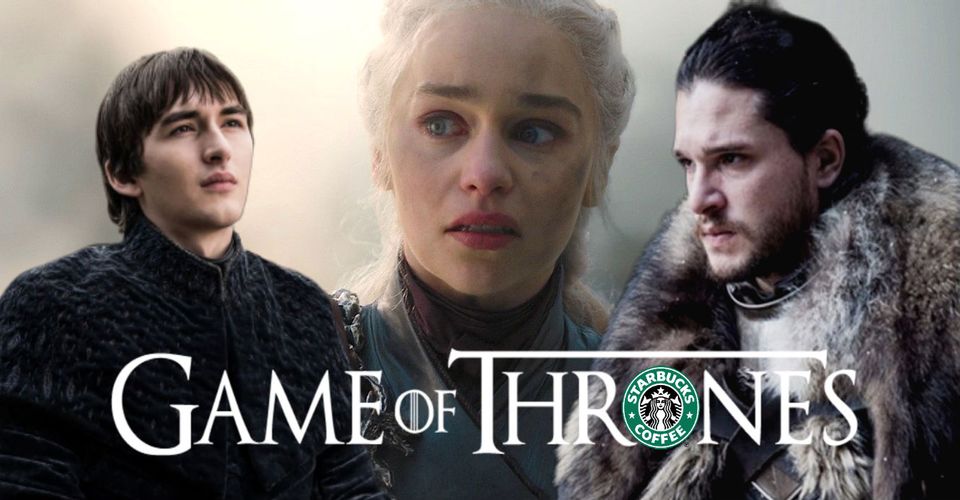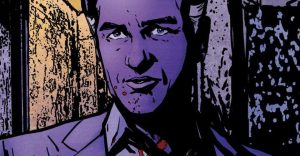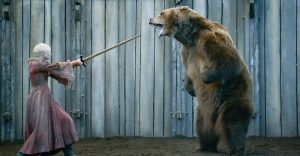What Went Wrong With Game Of Thrones Season 8

After reforging the landscape of television, how did Game of Thrones season 8 end the landmark series on such a negative? George R.R. Martin’s A Song of Ice & Fire books always enjoyed a cult popularity, especially among fans of fantasy literature, but it’s difficult to fathom the colossal leap in popularity Martin’s world enjoyed once the HBO TV adaptation arrived. A whirlwind of blood, breasts and beheadings, Game of Thrones was also deeply political, visually groundbreaking, and featured a cast of characters the audience couldn’t help but either cheer for eternally or boo relentlessly. By the time its third season aired, Game of Thrones had become a genuine international phenomenon, its rise seemingly unstoppable.
Game of Thrones would go on to break television records for its epic-scale production, gargantuan viewership and, perhaps less enviably, popularity in the world of illegal downloads, and the story of Westeros only seemed to get bigger with each passing season. And as much as Game of Thrones appeared invincible in the ratings, the series was also critically untouchable for much of its run, with reviews and fan reaction consistently positive and often glowing.
Naturally, there was an unprecedented level of hype and anticipation leading up to Game of Thrones‘ final season, and with Martin’s book series still running, the end of the story was a closely guarded secret. So lofty were fan expectations ahead of season 8, Game of Thrones faced an almost impossible task in satisfying their audience completely, but no one expected the ending to fail quite as spectacularly as it did. Petitions were set up asking for season 8 to be remade, Twitter exploded with rage and confusion, and Game of Thrones season 8 replaced Lost‘s finale as the go-to example of a controversial TV ending. With such a dramatic fall from grace, what went wrong with Game of Thrones season 8?
Game Of Thrones Needed More Seasons

There are many problems with Game of Thrones season 8, but the majority of them trace back to one inarguable truth: the series needed much more time to arrive at a natural conclusion. The ending of Game of Thrones was announced well in advance, with confirmation coming while season 6 was still on the air. After fans discovered only 2 seasons of Westeros action remained, they later learned that those final seasons would also comprise a shorter episode count, and this caused concern, since there was so much ground yet to cover at the time. With Game of Thrones still critically invulnerable in its sixth season, many gave Benioff and Weiss the benefit of the doubt, but those initial misgivings proved entirely justified.
Even since its debut season, Game of Thrones has been a slow build, spending time carefully crafting characters, interweaving their narratives and exploring different parts of Martin’s fantasy world. While this measured pace could sometimes be frustrating (just how long did it take Daenerys to sail across the sea?), it was actually one of Game of Thrones‘ greatest strengths, giving the narrative and the colorful cast of characters room to grow organically. By contrast, Game of Thrones season 8 is a mad rush to the finish line. Drastically upping the pace, main players zoom around the map in record time, while the gripping character interactions Game of Thrones was once renowned for were curtailed to make room for plot, plot and more plot.
Not only is the gear shift incredibly jarring, the breakneck pacing took away the depth that helped make Game of Thrones so successful, replacing it with superficial scenes geared solely towards covering narrative ground. George R.R. Martin himself has even admitted surprise that Game of Thrones ended when it did, claiming he expected the series would need to run far longer.
The Game Of Thrones TV Series Overtook The Books

Speaking of A Song of Ice & Fire‘s composer, there’s a clear correlation between Game of Thrones‘ drop in quality and the moment the HBO series overtook its source material. Benioff and Weiss never sought to adapt Martin’s books verbatim, and even in the earlier seasons there are moments, characters and storylines that deviate considerably. By and large, however, the live-action Game of Thrones follows each major aspects of the books and retains Martin’s general outline for each character. Benioff and Weiss proved themselves highly adept at taking an incredibly detailed and widespread series of novels and diluting it into a cohesive, but still rich, TV story. Unfortunately, the showrunner duo were less successful when finding their cupboard of novels to work from bare.
It’s impossible not to notice the point where Martin’s storytelling and characterization ends and that of Benioff and Weiss begins. The shocking narrative twists of earlier seasons give way to awkward attempts at subverting expectations, such as the moment Arya takes out the Night King. The deaths that once provoked months of discussion from viewers began to lack emotional impact, while the intricate plotting became more direct, with season 8 in particular moving from point A to point B without stopping to admire the scenery. Season 8 may take the brunt of the Game of Thrones flak, but the show’s decline can actually be traced back further, and the more original material begins to seep into the scripts, the more flaws start to emerge.
Out Of Character Characters

One massive bugbear fans had with Game of Thrones season 8 was when their favorite characters suddenly stopped acting like their favorite characters. The most frequently cited example of such inconsistency is Daenerys’ decimation of King’s Landing. While the Mother of Dragons had always harbored an inner darkness bubbling beneath the surface, she remained a staunch protagonist in season 8, and her decision to burn innocent people alive seemed to come out of nowhere. The combining triggers of fragile ego, a lust for power and genetic destiny were all present, but certainly didn’t add up to the level of carnage Dany unleashed, leaving many fans to cry foul.
Emilia Clarke’s character wasn’t alone in feeling like a totally different character in Game of Thrones season 8. Jon Snow went from being one of the most compelling figures on TV to a shallow and predictable hero, spouting the same lines about bending the knee and not wanting the throne until being put out of his misery by a merciful exile beyond the wall. The King in the North had many standout moments throughout Game of Thrones, but it’s telling that none of them are to be found in the final season, which should’ve been his time of glory. Cersei and Jaime’s deaths also proved particularly divisive among viewers, with general consensus claiming neither got the end they deserved and neither acting in a way their respective arcs had been building towards.
This particular criticism is perhaps a direct result of the above 2 points. When the storywriting pen is handed from one to another, there are bound to be shifts in character, and the lack of books to guide the TV series undoubtedly made the unstable characterization more prominent. The need to wrap things up inside 2 seasons also played a considerable part in this. The actual end point of Game of Thrones, with Jon killing Daenerys and Bran sitting on the throne, isn’t problematic in itself, it just hadn’t been sufficiently built towards. With more episodes, Dany’s villainous turn and Bran’s royal rise could’ve been developed gradually and foreshadowed carefully, making the eventual big moments less confusing and contrived.
Season 8 Made Needless Mistakes

Some of the Game of Thrones season 8 problems mentioned above were, admittedly, not easy to avoid. The number of seasons would’ve been influenced by budget restraints, talent contracts and other non-creative factors that arguably left Game of Thrones short of its ideal length through no direct fault of its own. Meanwhile, the issue of depleted source material also can’t be laid at the door of Benioff and Weiss. Many have tried to get George R.R. Martin to speed up his writing process, and the more fans ask the author about the fabled The Winds of Winter, the slower he seems to progress. It would’ve been unrealistic to pause the TV series until Martin released more books, so the decision to move into original content was a necessary, if ultimately detrimental, one.
But some of Game of Thrones‘ season 8 smaller mistakes were entirely avoidable. From a production standpoint, there’s the infamous stray coffee cup and the controversial Battle of Winterfell, which was so dark many viewers could barely tell what was happening. Visual gaffes can be found throughout Game of Thrones, but these seemed more overt, more frequent and more unnecessary than ever before, contributing to a general sense of sloppiness compared to past seasons. Moving onto the story and plotting, the sequence of events that constitutes Game of Thrones‘ finale feels haphazard and poorly planned. A prime example comes when the audience sees Varys frantically writing letters shortly prior to his death; the scene feels significant at the time, but ultimately proves irrelevant.
Major Plot Points Never Paid Off

When modern TV audiences talk about the success or otherwise of a finale, they no longer measure in terms of spectacle, drama or excitement, but in satisfaction. Long-running series are seen as an investment of time and emotion on behalf of an audience, and if that effort isn’t paid off by the ending, the entire journey can feel like a wasted exercise. By this yardstick, Game of Thrones season 8 was very much a failure, as so many once-important plot points fell by the wayside.
The biggest victim of this storyline cull was the long-running mystery of Jon Snow’s parentage. Among book readers, the R+L=J theory had been central to the entire series for years, with Jon’s Targaryen heritage easily the biggest point of discussion at the end of each season. So imagine the general sense of disappointment when Jon being a Targaryen had absolutely no impact on Game of Thrones‘ ending. The heroic crow of Winterfell continued to deny his birthright, and even after Daenerys was out of the picture, Jon was sent North to live out his days far from King’s Landing – an ending that would’ve played out exactly the same if he really was Ned Stark’s bastard.
To make matters worse, R+L=J was far from the only story Game of Thrones started without finishing. The importance of the Night King and his recurring symbol was swiftly dealt with in the space of a single episode, the Reed family were never revisited, Bran and the Three-Eyed Raven remained a sizable unknown, many of the series’ prophecies went unfulfilled, the entire Dorne story was abandoned, the mysterious masked Quaith in season 2 wasn’t expanded upon, and the fate of Daenerys’ settlements in Essos is left ambiguous. Game of Thrones‘ ending seemed to lose sight of the show’s own history in favor of a more reactive approach towards the end, ticking off what it could and ignoring the rest, and this left a large chunk of the audience feeling like the questions they’d been pondering for 8 seasons had all been for naught.
About The Author


















